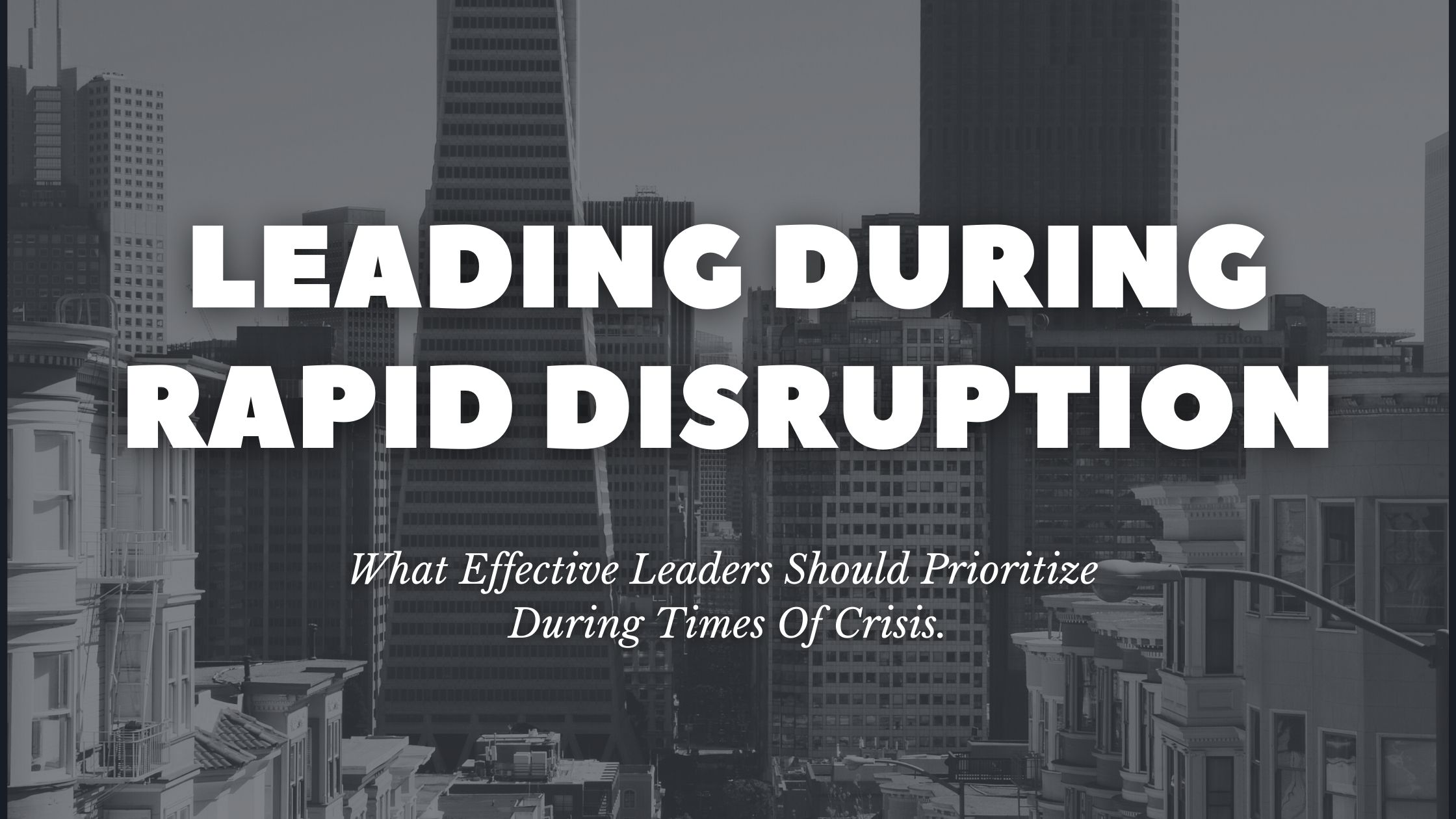What Effective Leaders Should Prioritize During Times Of Crisis.
More than ever before, sales leaders are navigating in environments of rapid disruption. Tight budgets, remote working, and other restrictions have placed a huge stress on how leaders need to adapt to the ever-changing landscape. Being an effective (and respected) leader has never been easy, but it’s certainly much harder in a high-risk environment.
When a crisis strikes, there is often little time to prepare. Additionally, there’s no telling how long a crisis will take to blow over. What we thought would be a few weeks has quickly turned into over 10 months of social distancing (& counting).
Having the right priorities as a leader becomes more important than ever. What would you add to the list below?
1. Human-to-Human Connections through trust and transparency
Human-to-human means opening up with your team beyond the surface level. Your employees need to see that you have your own strengths and weaknesses just like them. Now more than ever, employees are looking for their leaders to be more open and human and less perfect.
It’s not about having the right answers, but admitting when you’ve made the wrong decision and doing your best to correct the situation. This way, the entire team, and organization learn from the situation, remind each other of policies and core values, and be better equipped for any future challenges.
The human-to-human connection transcends throughout the company and your culture, establishing a new type of loyalty and attitude. Remaining open and honest about company needs or changes in expectations keeps employees engaged and aware of their purpose in the company. If you are transparent, especially in turbulent times, you actually strengthen your leadership as people begin to trust you as a person and will respect you more as a leader.
Need to build some confidence first? Our Founder and CEO, Ryan Pereus shared his thoughts at the beginning of lockdown after a hard week here at Superhuman – give it a watch here.
2. Communicating More
A good leader always communicates authentically, but especially during times of crisis. Never leave room for assumptions, talk with your employees to get a better sense of how they are handling the situation. Whether it’s with employees or clients, leaders need to communicate more frequently in times of crisis.
The people around need your support as a leader. There’s really no such thing as overcommunication in these circumstances. Take it a step further and think about what you can do as a leader to help them through it.
According to The Psychology Behind Effective Crisis Leadership from the Harvard Business Review
Leaders who acknowledge their employee emotions and give them a sense of context and reality is called, “holding”.
Holding allows people to channel their desire to act into something purposeful, and it allows them to more fully be themselves (and thus to be more mentally healthy). People never forget how managers treated them when they were facing loss. It is leaders who hold through this crisis, the author believes, who will keep their organizations afloat and to whom we’ll turn when the time comes to articulate a vision for the future.
Gianpiero Petriglieri
3. Doing The Right Thing
Warren Gamaliel Bennis, widely regarded as a pioneer of the contemporary field of Leadership studies once said, “Managers do things right; leaders do the right thing.”
Leaders need to be aware of what is going on in their business, how situations are developing, and be ready to intervene when problems occur. They have the tough job of getting everyone on the same page going towards the same destination. In times of rapid disruption, one wrong choice can be a slippery slope down.
Before looking at how to be an ethical leader, try to consider what might lead you to become an ethical failure. Organizational causes could include a lack of positive role models, standards, or accountability.
Not feeling like a good leader? That’s okay!
Bennis believed leaders are made, not born. He taught that leadership was a set of skills that can be learned through hard work. You can start by:
- Defining Your Organization’s Values
- Knowing Your Personal Values
- Setting the Tone for Your Company
- Being Courageous
- Sticking to Your Word & Following Through
4. Being Adaptable and Resilient
A leader’s resilience is drawn from several different attitudes, thinking styles, and
behaviors.
As a first step, leaders need to take responsibility for developing their own resilience and be aware of their own strengths and weaknesses. A critical skill for the development of personal resilience is the ability to reflect and learn from challenging experiences.
A useful model to help leaders do this is the experiential learning cycle. The
diagram below outlines the process leaders can follow to learn about how you adapt and behave in certain experiences. Use these key points to help you adapt better to your situations.
- Have the Experience – Put yourself into challenging situations that will give you the
opportunity to develop and broaden your skillset. Draw on different resilience tools and
techniques according to what suits your needs or the situation. - Review the Experience – After the event, try to explore all the details of your experience. Think about the context, what you were thinking, what you did, what the impact was, and the outcome. If you drew on specific tools or techniques, how well did they work?
- Conclude from Experience – Try to summarise what you have learned from the experience and how you have dealt with the situation. What approaches did/didn’t work?
- Plan Action for Improvement – Based on your conclusions, plan the next actions so that you can do a better job next time. Are there other tools or techniques that you could try?
The MOST Important Lesson?
REMEMBERING: Your actions will always speak louder than your words, so set an example by following your convictions and you’ll inspire those around you to do the same.







